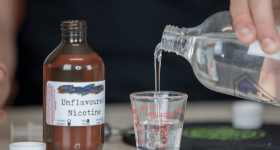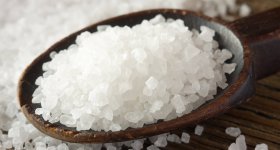1. What is propylene glycol?
Propylene glycol is actually a small molecule with two hydroxyl groups (-OH), has a colorless, odorless liquid form and is completely soluble in water. It is obtained from the hydration of propylene oxide, which is derived from petroleum products.
They are also known by other names such as 1,2-propanediol; propane-1,2-diol; 1,2-Propylene glycol; Methylethylene glycol; 2-Hydroxypropanol; Methylethyl glycol; Monopropylene glycol.
The molecular structure of propylene glycol:
- Chemical names are: Propylene glycol, 1,2-Propanediol.
- Case no: 57-55-6.
- Chemical formula: CH3-CH(OH)-CH2OH; C3H8O2
What is propylene glycol?
2. Physical and chemical properties of Propylene glycol
Let's learn more about this substance through their physicochemical properties as follows:
- Has low volatility.
- Is a colorless liquid.
- They are almost odorless.
- Exists in a liquid state.
- A substance that is soluble in water.
- Soluble in most organic solvents.
- Molecular Weight: 76.10.
- Purity >99.8% wt.
- Water <0.2% by weight.
- Boiling point, 760mmHg: 187.4oC (369.3oF).
- Boiling point limit: 186-189oC (367-372oF).
- Freezing temperature: < -57oC
- Specific gravity 20/200C:1.038.
- Viscosity 250C: 48.6 centipoise.
- Surface tension of 250C: 36mN/m.
- Flash point: 104oC (220oF).
- Auto-ignition temperature: 371oC.
- The chemical molecules of propylene glycol are chemically neutral, which means they usually do not react with other substances.
Physicochemical properties of Propylene glycol
3. Important Applications of Propylene Glycol
Propylene glycol has important applications in various fields and industries of life. As follows:
3.1 Important applications in the cosmetic industry
- According to research, Propylene Glycol is a commonly used ingredient in more than 4,000 products and cosmetic formulations. Commonly used products include: moisturizers, lotions, fragrance oils, or solvents.
- They are also used as a humectant as well as a viscosity reducer in cosmetics. Also as a solvent or bridging agent to improve emulsification stability. Is a very safe product to use in the above products and the concentration can be up to 50%.
- Has the role of creating foam of shampoo, helping to keep the scent longer. Therefore, they are used a lot in skin and hair care products because of their ability to retain moisture in the skin, preventing water loss.
- This is also a preservative and antifreeze in lip products.
Important applications in the cosmetic industry
3.2 Industrial applications
- Because of its greater safety, Propylene glycol is used as a substitute for ethylene glycol in many commercial antifreeze formulations.
- Up to 45% of propylene glycol is used as a chemical feedstock for the production of unsaturated polyester resins.
- They are also used as humectants, solvents and additives in food, pharmaceuticals and tobacco products.
- This is also one of the main ingredients (accounting for <1.92%), along with vegetable glycerin (VG) of e-liquids, cartridges used in e-cigarettes.
- It is a chemical widely used in the imaging industry and is a component of film coatings.
- An important ingredient in the oil dispersant Corexit, which is widely used in oil spills.
3.3 Applications in the food industry
- Propylene glycol also inhibits the growth of molds and bacteria.
- As a solvent for dissolving spices, fragrances as well as colors for food and beverage.
- Used in confectionery, meat, cheese, canned and other foods as a preservative, humectant, softener as well as to give structure to food.
3.4 Roles in the pharmaceutical industry
- It is an important solvent in pharmaceuticals, even used for oral or injection.
- They are also widely used in veterinary medicine as an oral treatment for hypertension in ruminants.
Role in the pharmaceutical industry
4. Is Propylene Glycol Harmful?
According to the results of the FDA, Propylene glycol is recognized as a safe substance. If contact does not cause irritation to sensitive skin or even prolonged direct contact with undiluted chemicals.
If accidentally in the eyes, causing eye irritation but mild and temporary, the condition will subside quickly and without danger.
Propylene glycol can be easily converted in the liver into the normal products of the citric acid metabolism cycle, so if you enter the body, you can rest assured that this is a completely non-toxic substance for the body.

